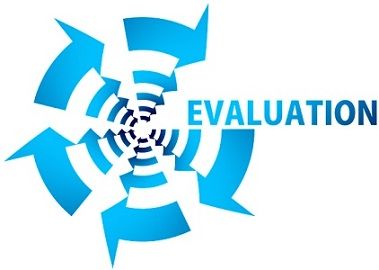в чем разница между evaluation и assessment
Difference Between Assessment and Evaluation
August 23, 2011 Posted by koshal
Assessment vs Evaluation
Assessment and Evaluation are two different concepts with a number of differences between them starting from the objectives and focus. Before we go into details about these differences that set assessment and evaluation apart, let us first pay attention to the two words themselves. According to the American Heritage Dictionary, assessment means appraisal. Then, according to the same dictionary, evaluation is estimation or determining the value of something. So, these processes are used in the field of education very often to test the quality of teaching and learning processes. That is done to let the educational institutes find out what more can be done to improve the education offered by those educational institutes.
What is Assessment?
Assessment of a process means we are understanding the state or the condition of that process through objective measurements and observations. When it comes to education, assessment means the same as the general meaning of the word, but we have to remember another fact. That fact is that assessment in education is done in order to improve the process. The assessment pays attention to learning, teaching, as well as the outcomes.
When it comes to the timing of an assessment, it is an ongoing process that is determined to improve learning. Think about this. An assessment can be a small paper given to the students by their lecturer. The intention of such a paper is to understand how well the students know the components of the subject. This shows how much they have learnt. Also, some lecturers like to give assessment tests at the beginning of the course to find out what the students know already about the subject. This is done so that the lecturer can have a general idea and can arrange the course content to suit the needs of the students.
What is Evaluation?
Evaluation is determining the value of something. So, more specifically, in the field of education, evaluation means measuring or observing the process to judge it or to determine it for its value by comparing it to others or some kind of a standard. The focus of the evaluation is on grades.
When it comes to the timing of an evaluation, it is rather a final process that is determined to understand the quality of the process. The quality of the process is mostly determined by grades. That is such an evaluation can come as a paper that is given grades. This type of paper will test the knowledge of each student. So, here with the grades, the officials come try to measure the quality of the programme.
What is the difference between Assessment and Evaluation?
• Definition of Assessment and Evaluation:
• Assessment of a process means we are understanding the state or the condition of a process through objective measurements and observations.
• Evaluation is determining the value of something.
• Timing:
• Assessment is more of an ongoing process. It is formative.
• Evaluation is more of a final process. It is summative.
• Focus of Measurement:
• Assessment is known as process-oriented. That means it focuses on improving the process.
• Evaluation is known as product-oriented. That means it focuses on the quality of the process.
• Administrator and Recipient:
• The relationship administrator and recipient share in assessment is reflective. There are internally defined goals.
• The relationship administrator and recipient share in evaluation is prescriptive as there are standards that are externally imposed.
• Findings:
• Findings are diagnostic in assessment as they are for identifying areas that need improvement.
• Findings are judgmental in evaluation as they come to an overall score.
• Modifiability of Criteria:
• Criteria are flexible in assessment as they can be changed.
• Criteria are fixed in evaluation to punish the failures and reward the success.
• Standards of Measurements:
• These standards of measurements in the assessment are set to reach ideal outcomes.
• These standards of measurements in the evaluation are set to separate better and worse.
• Relationship between the students:
• In the assessment, the students are trying to learn from each other.
• In the evaluation, the students are trying to defeat one another.
• Outcome:
• Assessment shows you what needs improving.
• Evaluation shows you what has already been achieved.
As you can see, both assessment and evaluation are important processes in the field of education. In other fields also, assessment and evaluation play important parts. For example, think that there is a software. The creators can give this software to a group and ask them to use it and tell what they think. Here, that is an assessment as they get to see what needs improving and what has been done correct. Then, once the software is completed, the same group can evaluate this. That evaluation will rate how good the software is.
Difference – estimate / evaluate / appreciate / assess
APPRECIATE
appreciate (v) – appreciation (n)
Умственная характеристика
оценить по достоинству / ценить в душе / быть благодарным
ESTIMATE = a guess ( в цифрах)
to estimate (v.) – estimation (n.)
дать ПРИБЛИЗИТЕЛЬНУЮ оценку в цифрах
прикинуть (догадаться) на основе имеющейся ситуации
to estimate costs
to estimate size
to estimate the number
ВНИМАНИЕ. assess и evaluate совпадают в значении “внимательно обдумать, прежде чем составить своё мнение”, и эти два слова можно одинаково использовать, но есть кое-какие различия
ASSESS (реже используется) = evaluate
to assess (v) – assessment (n) – an assessor (n)
to assess risks – оценить риски
to assess damages – оценить ущерб
to assess needs – оценить потребность
to assess quality – оценить качество
to assess value – оценить стоимость
to assess changes – оценить изменения
The building of the hotel was assessed at one million dollars
The insurance company will assess the damage to the car
The study assesses the medical needs of people living on government aid
EVALUATE (чаще используется) = assess
to evaluate (v) – evaluation (n) – evaluable (adj)
Collocations = Устойчивые выражения
to evaluate smb’s progress – прогресс
to evaluate achievements – достижения
to evaluate suitability for a job — оценить чью-л. пригодность для какой-л. работы
to evaluate work
to evaluate the information
to evaluate success
to evaluate drug / nutrition / diet programs – лекарство / питание / диету
to evaluate the outcome – последствия мероприятия
The performance of each employee is evaluated once a year
He was evaluated as unfit for military service.
Как употреблять в жизни
Ситуация из жизни – ремонт в кухне (kitchen remodel).
Ты нанимаешь строителей. И началось))))
Сначала они прикидывают стоимость работ – estimate the cost of remodelling
Затем они выдают точную стоимость услуг – assess the value of remodelling
Далее ты оцениваешь их достижения – evaluate progress / achievements
И наконец, ты, довольный и радостный, ценишь их качественную работы – appreciate their work
Об измерениях и оценках на английском: count, calculate, estimate, assess, evaluate, measure, gauge, rate, appraise, determine
Те, кто владеет английским на высоком уровне часто признаются, что чем больше слов, тем сложнее выбрать правильное. Действительно, с расширением вокабуляра появляется постоянная необходимость выбора самого подходящего слова. Конечно, можно выбрать одно универсальное и употреблять его везде. Но на высоком уровне так не получается. Чем выше уровень, тем сложнее и глубже темы, тем больше идей нужно выразить, тем более точно стоит подбирать лексику.
И преподаватели и изучающие подтвердят, что знание разницы между близкими по значению словами даёт гибкость, более глубокое понимание языка и автоматизм в использовании лексики. Именно поэтому на страницах блога ENGINFORM я регулярно знакомлю вас с оттенками значений глаголов, прилагательных, существительных. В разделе Выбор слова я объясняю разницу между словами в английском, которые мы часто путаем.
To count — считать, называть числа по порядку, или считать количество чего-либо:
To calculate — считать в значении «вычислять», используя математические действия: сложение ( addition ), вычитание ( subtraction ), деление ( division ), умножение ( multiplication ), или при помощи калькулятора:
To calculate the proportion — вычислить пропорцию
I calculated that it would take me a year to prepare for an exam. — Я посчитал, что подготовка к экзамену займёт у меня год.
To measure — измерять, определять размеры, количество или другие показатели, используя какие-либо измерительные приборы или методы:
To measure the length of the table — измерять длину стола
To measure one’s temperature — измерять кому-то температуру
It is impossible to measure the success of the campaign without statistics. — Невозможно измерить успех кампании без статистики.
To gauge /ɡeɪdʒ/ — замерять, тщательно измерять параметры чего-либо, используя измерительные приборы (близко к measure ) или давать оценку качествам и характеристикам, применяя собственное суждение (в этом значении ближе к judge, estimate ):
I cannot gauge the length of the detail with the naked eye. — Я не могу измерить длину детали невооруженным глазом.
It is hard to gauge my feelings and moods. — Сложно измерить мои чувства и настроения.
To estimate — оценивать количество, стоимость, используя свои догадки, предположения или информацию и данные для оценки. Обычно этот глагол подразумевает числовой результат — ответ на вопрос «Сколько?», полученный путем анализа имеющихся данных:
He analysed the data to estimate the value of the house. — Он проанализировал данные, чтобы оценить стоимость дома.
Without the calculations I can estimate the amount only roughly. — Без вычислений я могу только приблизительно оценить количество.
To estimate the height — оценить высоту
To estimate the price of something — оценить стоимость чего-либо
I estimate the crowd as over a hundred people. — Я оцениваю, что в толпе более ста человек.
To evaluate — оценивать какие-либо характеристики, не обязательно количественные и числовые (не смотря на слово value в основе слова), а часто абстрактные; давать субъективную, качественную оценку чего-либо:
I evaluated the conditions and concluded that the hotel was quite comfortable. — Я оценил условия и пришел к выводу, что отель был достаточно комфортный.
Please, evaluate my essay. What do you think of my style? — Пожалуйста, оцени моё сочинение: что ты думаешь по поводу моего стиля?
It is difficult to evaluate her as a teacher. — Сложно дать ей оценку как преподавателю.
To assess the situation — оценить ситуацию
Tomorrow the examiners will assess our knowledge of grammar. — Завтра экзаменаторы будут оценивать наши знания грамматики.
Who can assess the value of this painting? — Кто может дать оценку ценности этой картины?
To assess the damage after the storm — оценить ущерб после шторма
И еще один пример, чтобы лучше проиллюстрировать разницу между тремя глаголами в одном и том же контексте:
To appraise — близкий к вышерассмотренным глагол, который обозначает «оценивать, определять количество или стоимость чего-то» (как и estimate ) или же определять значимость, статус, ценность чего-либо (как и evaluate ) — давать критическую оценку. Отличие appraise от остальных глаголов в том, что речь чаще всего об экспертной, формальной оценке:
To appraise the writer’s career — дать оценку карьере писателя
The house and the other property must be appraised by an expert before it can be ensured. — Дом и другое имущество должно быть оценено экспертом перед страхованием.
To appraise the jewel — оценить драгоценность
To rate one’s the skills for the job — оценивать навыки для работы
He is rated as a top-player in his team. — Он считается топовым игроком в его команде.
Her colleagues rate her very highly. — Её коллеги оценивают её очень высоко.
To determine — этот глагол формальный имеет широкое значение и может относиться не только к количественным данным, но и к принятию решений. В контексте оценивания — дать оценку, определить, принять решение, часто используя вычисления, изучая данные и свидетельства чего-либо, но об этом нужно уточнять отдельно, потому что сам глагол этой информации не несет:
The amount of money the insurance company is willing to pay is determined by the value of the property. — Количество денег страховая компания готова выплатить определяется стоимостью имущества.
We will determine the number of people we can hire only after we get the reports. — Мы определим количество людей, которых мы сможем нанять только после того, как мы получим отчеты.
Обратите внимание, что все рассмотренные глаголы переходные, с подлежащим-человеком: кто-то оценивает, считает что-то. Некоторые примеры содержали пассивные формы, что уместно, когда исполнитель действия неизвестен, неважен или понятен по контексту.
Возможно вы, прочитав эту статью, подумали: «А что, если я выберу неправильное слово?»
Хорошая новость: мир не рухнет. Вы не носитель языка, и все это понимают. И даже если вы употребили не самое точное слово, и высказывание прозвучало неестественно, ваши собеседники поймут, что вы имели в виду.
Единственный верный и надёжный способ научиться выбирать правильные слова — практика. Разумеется, практика с обратной связью, коррекцией ошибок, понятными объяснениями, и использованием лексики в коммуникативных упражнениях и ситуациях. На Разговорном курсе в ENGINFORM мы занимается именно этим — помогаем разговориться, «оживляем» пассивный словарный запас, расширяем активный, дополняем ваш вокабуляр синонимами, учимся подбирать самые уместные и точные слова для выражения мыслей и говорить на английском автоматически, без внутреннего перевода и сомнений.
Записывайтесь на бесплатное вводное занятие, чтобы попробовать нашу методику, познакомиться с преподавателем, обсудить ваши пожелания и цели обучения. И после — приступайте к персональным занятиям с нашими преподавателями, которые знают, как сделать обучение интересным и эффективным!
Difference Between Assessment and Evaluation
Last updated on October 21, 2017 by Surbhi S

The basic difference between assessment and evaluation lies in the orientation, i.e. while the assessment is process oriented, evaluation is product oriented. The article presented to you describes all the distinguishing points between these two.
Content: Assessment Vs Evaluation
Comparison Chart
| Basis for Comparison | Assessment | Evaluation |
|---|---|---|
| Meaning | Assessment is a process of collecting, reviewing and using data, for the purpose of improvement in the current performance. | Evaluation is described as an act of passing judgement on the basis of set of standards. |
| Nature | Diagnostic | Judgemental |
| What it does? | Provides feedback on performance and areas of improvement. | Determines the extent to which objectives are achieved. |
| Purpose | Formative | Summative |
| Orientation | Process Oriented | Product Oriented |
| Feedback | Based on observation and positive & negative points. | Based on the level of quality as per set standard. |
| Relationship between parties | Reflective | Prescriptive |
| Criteria | Set by both the parties jointly. | Set by the evaluator. |
| Measurement Standards | Absolute | Comparative |
Definition of Assessment
Assessment is defined as a methodical way of acquiring, reviewing and using information about someone or something, so as to make improvement where necessary. The term is interpreted in a variety of ways, i.e. educational, psychological, financial, taxation, human resource and so on.
In general, assessment is an ongoing interactive process, in which two parties (assessor and assessee) are involved. The assessor is someone who assesses the performance based on the defined standards, while assessee is someone who is being assessed. The process aims at determining the effectiveness of the overall performance of the assessee and the areas of improvement. The process involves, setting up goals, collecting information (qualitative and quantitative) and using the information for increasing quality.
Definition of Evaluation
The term ‘evaluation’ is derived from the word ‘value’ which refers to ‘usefulness of something’. Therefore, evaluation is an examination of something to measure its utility.
Simply put, evaluation is a systematic and objective process of measuring or observing someone or something, with an aim of drawing conclusions, using criteria, usually governed by set standards or by making a comparison. It gauges the performance of a person, completed project, process or product, to determine its worth or significance.
The evaluation includes both quantitative and qualitative analysis of data and undertaken once in a while. It ascertains whether the standards or goals established are met or not. If they are met successfully, then it identifies the difference between actual and intended outcomes.
Key Differences Between Assessment and Evaluation
The significant differences between assessment and evaluation are discussed in the points given below:
Conclusion
So, after reviewing the points above, it would be clear that assessment and evaluation are completely different. While evaluation involves making judgments, assessment is concerned with correcting the deficiencies in one’s performance. Although, they play a crucial role in analysing and refining the performance of a person, product, project or process.
10 Key Differences between Assessment and Evaluation
August 5, 2019 By Hitesh Bhasin Tagged With: Human resources
The English language is full words whose meaning is quite close to each other that people get confused with their usage. Many people make a mistake with the usage of words like award and reward and attitude and aptitude.
Similarly, there is a pair of words assessment and evaluation, whose meaning is quite close yet different from each other.
Assessment is a systematic process of collecting information from diverse sources about something or someone to gauge the skills, knowledge, and usage, whereas the meaning of evaluation is concerned about making a judgment about quality, skills, or importance or something or someone.
When you assess a person, you assess the level of performance or that individual, and when you evaluate someone, you evaluate how much goal is attained by the individual.
These two words are commonly used in the academic system, and even teachers make the mistake of using these words interchangeably.
In this article, you will learn about the definition and usage of these words with the help of a few examples along with the key differences between them in tabular form.
What is Assessment?
The word “assess” is derived from the Medieval Latin word “assessee” whose meaning is “fix a tax upon.” Therefore, assessment can be defined as the process of collecting information about something or somebody from different sources to get the idea of the knowledge or skills or quality possessed by it.
The term “assessment” is used in various fields such as education, taxation, human resources, psychology, and financial fields, etc.
The purpose of conducting an assessment is to provide constructive feedback so that the assessee (the assessed person) can improve. Assessment is a continuous interactive process where two parties are involved.
The assessor who assesses the performance of an individual in a particular field or in various fields to help the assessee improve. The word assessment often is used to assess skills, abilities, aptitude, performance, and competence.
For examples, the teacher assesses the performance of students in various subjects to assess the abilities and IQ level of students and help students to improve their performance.
There are three types of assessment.
#1 Summative assessment:
Summative assessment is done of an individual to assess their learning by the end of a decided period.
#2 Formative assessment:
Formative assessment is a continuous learning process. The feedback is provided to an individual during the process to make improvements in learning.
#3 Alternative Assessment:
It is different from the traditional assessment. In alternative assessment performance of an individual is assessed and assessed how skillfully an individual can implement the knowledge that he or she has acquired during the learning process.
The example of this type of assessment is an examination system in schools. Where students have to take verbal and written exams, solve assignments, give presentations to order to prove their level of learning.
What is evaluation?
The meaning of the word “evaluate” is to make a judgment about something or someone to learn about their abilities or skills or qualities. The word evaluate is derived from the Latin word “valere” whose meaning is to “too strong, be of value, be well, or be worth.”
The outcome of the evaluation process is the result. In an exam, the person’s ability to apply his or her knowledge is evaluated, and based on the outcome; conclusions are drawn.
The evaluation process is conducted to compare the skills and qualities of two or more individuals. The person being evaluated must fulfill the criteria set by the evaluator. Unlike assessment, the result of does not provide constructive feedback, but it passes the judgment.
The term can be used to gauge the effectiveness of an education system, a course, a curriculum, a teacher, etc. evaluation is a thorough process of accessing the performance of someone or something to determine the difference between the actual and intended outcomes.
The key differences between Assessment and Evaluation
| Assessment | Evaluation |
|---|---|
| The meaning of assessment is to review the data about something or someone from different sources in order to make improvement in the current performance. | The meaning of evaluation is to judge the performance of something or someone by measuring the performance on the basis of existing standards. |
| An assessment is an ongoing process. | An evaluation provide closure on the existing process. |
| The purpose of assessment is to improve the quality of performance. | The purpose of evaluation is to judge the performance. |
| The assessment is an individualized process and is not done against already set standards. | The evaluation is applied against the set standards. |
| The orientation of assessment is process oriented. | The orientation of evaluation is product oriented. |
| The outcome of assessment is constructive feedback. | The outcome of evaluation is to show shortcomings. |
| The assessment is graded. | The evaluation is not graded. |
| While assessing the relationship between two parties is reflective. | While evaluating the relationship between two parties is prespective. |
| The criteria of assessment is decided by the mutual understanding of both parties involved in the process. | The criteria of evaluation is solely decided by the evaluator. |
| For example, teacher does assessment of students’ performance and provide constructive feedback. | For example, the evaluation of the skills of a candidate is done before hiring him or her for the job. |
Conclusion
However, evaluation and assessment are both used to review the performance of an individual. But these two terms are used in a completely different context.
The assessment is done to provide constructive feedback and the motive behind assessment to improve, whereas, evaluation is done to judge
the ability of an individual or system to pass judgment.





